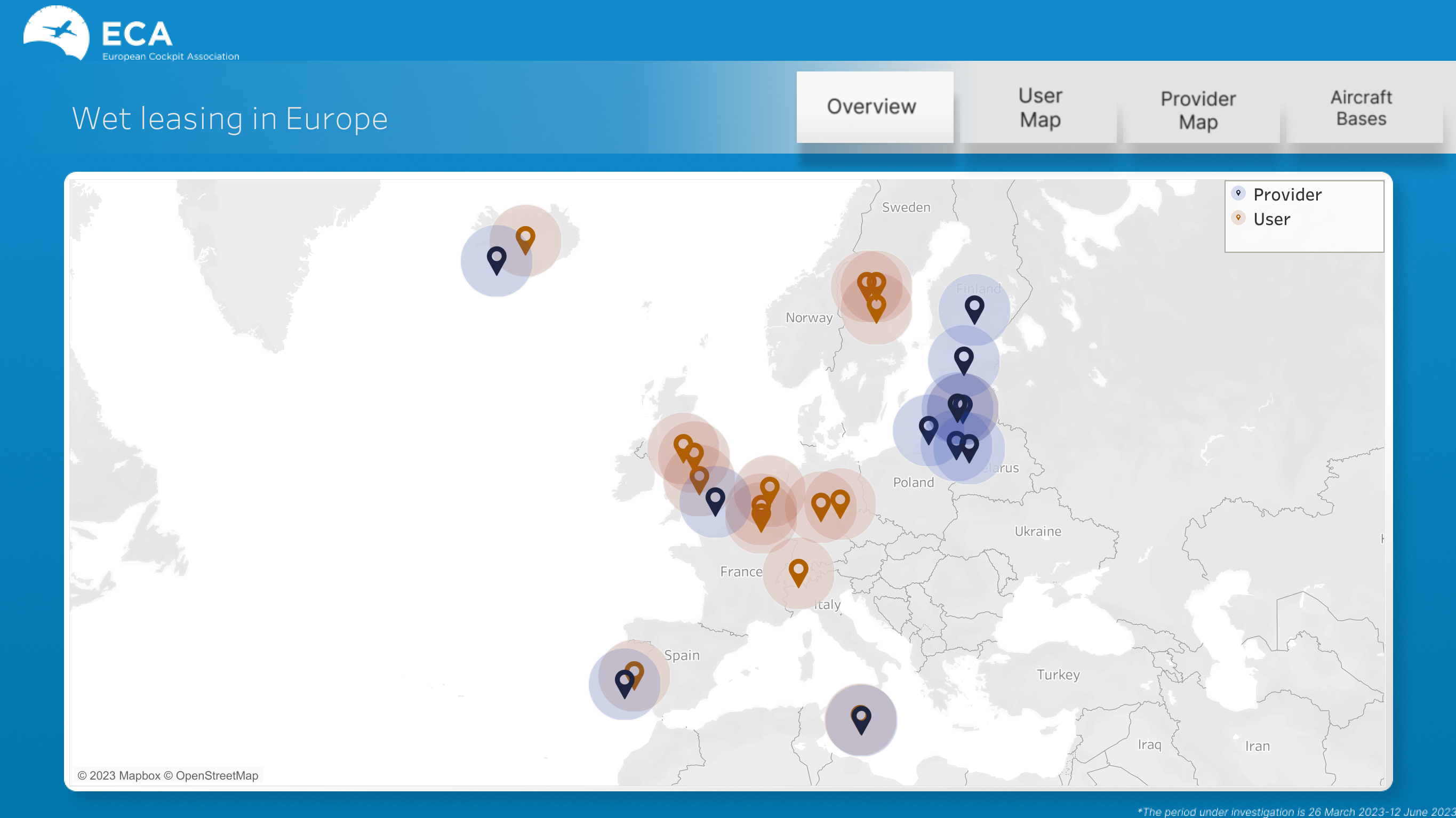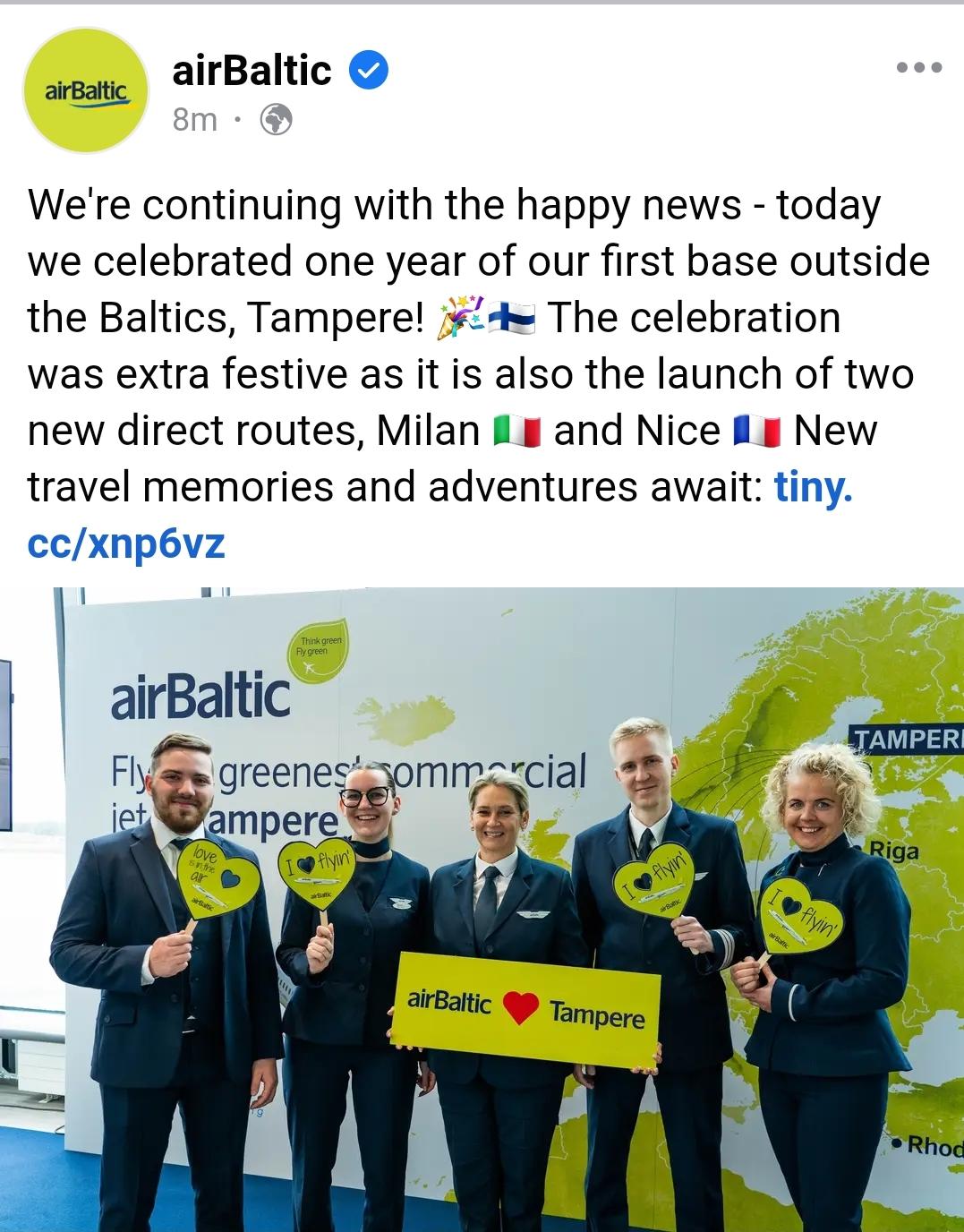

Wet-leasing, also known as ACMI (Aircraft, Crew, Maintenance, and Insurance) leasing, has become a common industry practice where airlines lease aircraft and accompanying crews from other carriers. Passenger feedback indicates dissatisfaction with the experience of flying on older aircraft and the lack of control over their airline choice. But there are growing concerns regarding potential labor law violations within the wet-leasing framework.
While wet-leasing is considered legal, it can also create a loophole that undermines labour and social rules. For example, wet-leasing providers often use self-employed crew or intermediaries that are not registered in the EU. This practice allows wet-leasing providers to bypass existing employment rules.

To understand the scope of the problem, ECA carried out an analysis of inter-country wet-leasing in Europe. An ECA team tracked aircraft on Flight Radar in the EU, including the UK, Switzerland, and Norway.
The dashboard only depicts wet-lease between different countries to show cross-border mobility. The dashboard exclusively focuses on depicting cross-border mobility through wet-leasing between different countries. The tracking started on 26 March 2023, the beginning of the summer season, and has been regularly updated in May and June. The next updates are scheduled for July and August. In terms of bases, a change of base and wet-lease is considered if an aircraft operates continuously from one base for at least two weeks, both commencing and concluding its duties there.
Sometimes, companies agree to wet lease a total number of aircraft of a specific type, without defining the registration numbers of aircraft in the contract (e.g. Finnair, AirBaltic). Due to the fact that FlightRadar is based on registration number of aircraft, and possible rotation of aircraft during the observation period, the dashboard may sometimes show higher number of aircraft and crew as posted within provider-user agreements.
Please note: This dashboard is a visualisation of the wet-lease, not a rigorous documentation of every flight. The aim of the dashboard is to give an impression of the scope of wet-lease in Europe, identify airlines who provide and use it, and highlight the responsibility of both providers and users for the social practices they use.
Wet-leasing enables airlines to use (bogus) self-employed pilots
In December 2020 Bluebird illegally laid off all 11 pilots working on a CLA with FÍA (Icelandic Airline Pilots‘ Association). Eleven bogus self-employed pilots were hired to Bluebird Nordic through Confair Consultancy (temporary work agency) simultaneously. The self-employed pilots took the jobs of the permanently hired pilots – for half their pay.
In September 2021, the Icelandic Labor court issued a ruling in the case of the Icelandic Airline Pilots' Association (FÍA) against the Confederation of Icelandic Enterprise (SA) on behalf of Bluebird Nordic. The ruling confirmed that it was illegal of Bluebird to lay-off pilots working according to a CLA with FÍA members while hiring bogus self-employed pilots to replace them.
Wet-leasing enables strike breaking
The Spanish government authorised the wet-leasing of 2 Alba Star aircraft to the airline Volotea during an industrial conflict in France. It is highly likely that the Spanish government was unaware of the existence of ongoing industrial action and became, without knowing, an essential contributor to an illegal strike-breaking.

Wet-leasing enables airlines to not register an operational base in a country where employees are mostly working
E.g. Air Baltic in Finland. In May 2023 AirBaltic celebrated 1 year of its base in Tampere (Finland). However, legally AirBaltic doesn't exist in Finland: no company, no employees, no observance of national Finnish rules regarding CLA. AirBaltic doesn't base its crew permanently there, instead it constantly places them on "business trips" for 3-6 days, and then back to Riga. The non-registration of the operational base means employment and social rights of the country where the workers are mostly working are not applied. This prevents them from having relevant minimum salary/social contributions.
This all results in the fact that employees usually don’t know who their contracting parties are and who is the legal employer, which is the violation of the provisions of Directive on transparent and predictable working conditions.
The aircrew on wet-lease is usually not declared posted (because posting stems from employment relationship) and are not provided with A1 certificates. In such situation the airlines hiring the wet-lease company can also be held liable by the posted worker with respect to any outstanding net remuneration corresponding to the minimum rates of pay and/or contributions due to common funds or institutions of social partners (generally known as subcontracting liability). But for this to happen, we need:
We urge the Member States to conduct the inspections of the airports this summer. We want employees’ documentation checked to receive the on-field information. This information will be the evidence of whether the wet-lease rules and posting rules are applied and duly observed, and whether the aircrew is duly protected during hectic summer season.
Know the conditions of your contract. There can be two possibilities:
1. You have employment contract. If you are sent to fly on a continuous basis for another airline, the posting rules are applicable to you. You shall be granted A1 certificate and the rules of the host country regarding work and rest periods, remuneration and social security shall be applicable to you.Please note, if you have employment contract with an airline, but you fly for a long period for another airline (e.g. 1 year), please consider contacting us for detailed advice. You might consider asking for direct employment from the host airline.
2. You have self-employed contract. First, avoid this situation! No matter how your payment is done, you still fly under subordination and control of one airline. The shifting of liability on pilot for the operation/incidents, which is done in self-employed contracts, is illegal! Ask the company/work agency, that you provide services for, to change your contract. Please, contact us in case you are in this situation! Be aware that the country where you are posted might re-classify your employment relation into direct employment. Self-employed workers also have obligations when carrying out work temporarily or partially as non-local self-employed workers, check the posting requirements for self-employed where you will be posted.
Know the law applicable to you.
You shall be always assigned a home base. In case of multiple jurisdictions involved (you are resident of country A, flying for airline based in country B, sent on a wet-lease to airline based in country C, flying an aircraft stationed in country D), usually the rule of your home base will be applicable: the place where you start and finish your duty. In case there’s no specific home base and you cannot see the pattern in operations you fly, please consider contacting us for advice.
Always report
Always report: fatigue, bad management practices, abuses. We know pilots are afraid of repercussions at present and even future workplaces, but your reporting and rigorous taking care of yourself can help to maintain safety on board and stop the spread of social abuses.